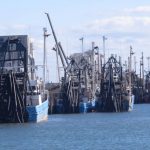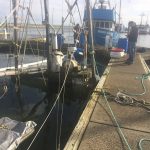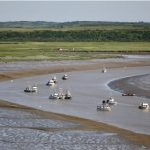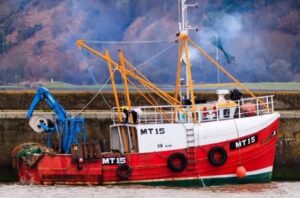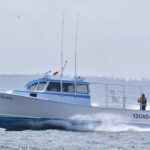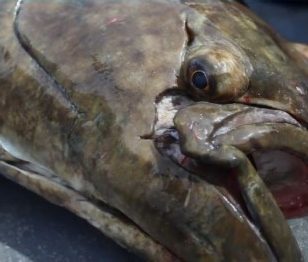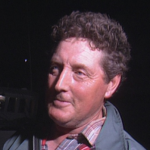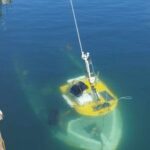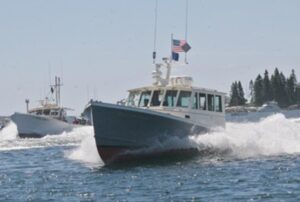Daily Archives: August 4, 2016
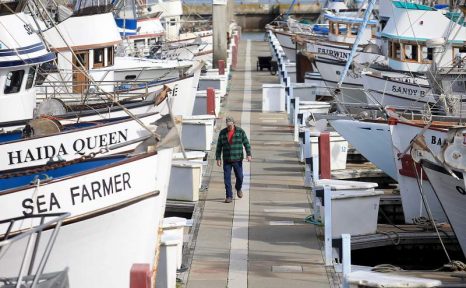
Delayed Dungeness crab season sinks catch, sales for California fishermen
A historic delay in the 2015-16 Dungeness crab season reduced statewide commercial landings by more than a third this year and cut into gross sales off the boat by about 44 percent, according to preliminary figures from the state. Bodega Bay, one of nine key commercial ports between Morro Bay and Crescent City, mirrored the sharp statewide downturn, with Dungeness landings down 37 percent from the previous season, to 1.8 million pounds, according to early calculations. The figures, from the state Department of Fish and Wildlife, offer the first postseason look at a grim year for the normally lucrative commercial Dungeness fishery — the state’s second-most valuable, worth about $60 million in most years. Gross sales last season for the crab fleet topped $33 million, about 45 percent of the 5-year average, according to state Sen. Mike McGuire, D-Healdsburg, chairman of the Legislature’s Joint Committee on Fisheries and Aquaculture. Read the story here 19:56
Louisiana Department of Wildlife and Fisheries sets fall inshore shrimp season opening dates
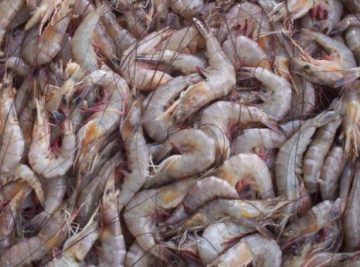 The fall inshore shrimp season will have a split opening with the eastern part of the state opening at 6 p.m. on August 15 and the west side opening at 6 a.m. on August 22. The Atchafalaya River is the boundary line between the regions. The Louisiana Department of Wildlife and Fisheries unanimously approved the dates at its meeting Thursday morning. LDWF biologists set the dates based on research and samples. All locals who spoke at the meeting supported the dates. When samples were taken last week, the shrimp in the western part of the state in Vermilion, Cote Blanc and Calcasieu basins were still very small. The shrimp in the eastern part in Barataria and Terrebonne basins were significantly larger. The extra week for the west will allow the shrimp time to grow to the proper size for catching. Read the rest here 17:47
The fall inshore shrimp season will have a split opening with the eastern part of the state opening at 6 p.m. on August 15 and the west side opening at 6 a.m. on August 22. The Atchafalaya River is the boundary line between the regions. The Louisiana Department of Wildlife and Fisheries unanimously approved the dates at its meeting Thursday morning. LDWF biologists set the dates based on research and samples. All locals who spoke at the meeting supported the dates. When samples were taken last week, the shrimp in the western part of the state in Vermilion, Cote Blanc and Calcasieu basins were still very small. The shrimp in the eastern part in Barataria and Terrebonne basins were significantly larger. The extra week for the west will allow the shrimp time to grow to the proper size for catching. Read the rest here 17:47
Connecticut Delegation Urges Obama to Designate First Ever Atlantic Marine National Monument
 U.S. Senator Richard Blumenthal (D-Conn.) led the Connecticut Congressional Delegation today in urging President Barack Obama to designate the New England Coral Canyons and Seamounts as the nation’s first ever Atlantic marine national monument. The letter, signed by Blumenthal, U.S. Senator Chris Murphy (D-Conn.), Congressman John Larson (CT-1), Congressman Joe Courtney (CT-2), Congresswoman Rosa DeLauro (CT-3), Congressman Jim Himes (CT-4) and Congresswoman Elizabeth Esty (CT-5), urges the President to use his authority under the Antiquities Act of 1906 to preserve and protect the unique environmental treasure. Designation as a national monument would protect the area from damaging commercial activity and ensure proper care and management. The measure would protect countless species from irreversible damage, help make the ocean more resilient to climate change, support economic activity reliant on the health of the ocean, advance research, and preserve natural history. Read the rest here 15:11
U.S. Senator Richard Blumenthal (D-Conn.) led the Connecticut Congressional Delegation today in urging President Barack Obama to designate the New England Coral Canyons and Seamounts as the nation’s first ever Atlantic marine national monument. The letter, signed by Blumenthal, U.S. Senator Chris Murphy (D-Conn.), Congressman John Larson (CT-1), Congressman Joe Courtney (CT-2), Congresswoman Rosa DeLauro (CT-3), Congressman Jim Himes (CT-4) and Congresswoman Elizabeth Esty (CT-5), urges the President to use his authority under the Antiquities Act of 1906 to preserve and protect the unique environmental treasure. Designation as a national monument would protect the area from damaging commercial activity and ensure proper care and management. The measure would protect countless species from irreversible damage, help make the ocean more resilient to climate change, support economic activity reliant on the health of the ocean, advance research, and preserve natural history. Read the rest here 15:11
Threatened restrictions on the commercial harvest of bluefish in New York State have been abandoned
 Threatened restrictions on the commercial harvest of bluefish in New York State have been abandoned after lawmakers urged federal regulators to take action to salvage the 2016 season. In an order this week, the National Oceanic and Atmospheric Administration determined bluefish are “not overfished or experiencing overfishing.” The order allows for more than 1.5 million pounds of quota to be shifted among states and the commercial sector, allowing New York’s harvest to reach the previous year’s levels of some 500,000 pounds. The move salvages a commercial fishing season that state officials said would have been “devastated” by a closure. Last month, NOAA had threatened to close New York’s commercial fishery for bluefish after the annual harvest of 360,000 pounds was reached. “It looks like our advocacy paid off and they took a second look at the data which we called out for being outdated and wrong,” U.S. Rep. Lee Zeldin’s office said in a email. Read the rest here 12:44
Threatened restrictions on the commercial harvest of bluefish in New York State have been abandoned after lawmakers urged federal regulators to take action to salvage the 2016 season. In an order this week, the National Oceanic and Atmospheric Administration determined bluefish are “not overfished or experiencing overfishing.” The order allows for more than 1.5 million pounds of quota to be shifted among states and the commercial sector, allowing New York’s harvest to reach the previous year’s levels of some 500,000 pounds. The move salvages a commercial fishing season that state officials said would have been “devastated” by a closure. Last month, NOAA had threatened to close New York’s commercial fishery for bluefish after the annual harvest of 360,000 pounds was reached. “It looks like our advocacy paid off and they took a second look at the data which we called out for being outdated and wrong,” U.S. Rep. Lee Zeldin’s office said in a email. Read the rest here 12:44
Enviro Defense Fund Applauds 9th Circuit’s Pacific whiting fishery ruling
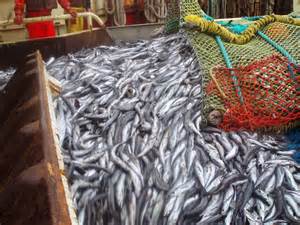 The Ninth Circuit on Wednesday upheld a federal program that limits the number of Pacific whiting, or hake, fishermen can catch off the Northwest Coast. Two fishing companies, Pacific Dawn and Jessie’s Ilwaco Fish Co., sued the Secretary of Commerce and the National Marine Fisheries Service in 2013, claiming the Fisheries Service unreasonably refused to consider fishing activity after 2003 and 2004 when it set new quotas in 2011 and 2013. The three-judge panel Wednesday refused to overturn U.S. District Judge Thelton Henderson’s 2013 grant of summary judgment. Writing for the panel, Judge Sandra Ikuta agreed that the Fisheries Service considered more recent fishing activity when it set quotas but that it “gave greater weight to historic participation” in setting the new limits. Pacific Dawn said it was “disappointed’ with the ruling. “The decision upholds an individual fishing quota program that resulted from no meaningful consideration of current harvests or present participation in the fishery, as Congress requires,” Pacific Dawn said in a statement. Read the rest here 11:59
The Ninth Circuit on Wednesday upheld a federal program that limits the number of Pacific whiting, or hake, fishermen can catch off the Northwest Coast. Two fishing companies, Pacific Dawn and Jessie’s Ilwaco Fish Co., sued the Secretary of Commerce and the National Marine Fisheries Service in 2013, claiming the Fisheries Service unreasonably refused to consider fishing activity after 2003 and 2004 when it set new quotas in 2011 and 2013. The three-judge panel Wednesday refused to overturn U.S. District Judge Thelton Henderson’s 2013 grant of summary judgment. Writing for the panel, Judge Sandra Ikuta agreed that the Fisheries Service considered more recent fishing activity when it set quotas but that it “gave greater weight to historic participation” in setting the new limits. Pacific Dawn said it was “disappointed’ with the ruling. “The decision upholds an individual fishing quota program that resulted from no meaningful consideration of current harvests or present participation in the fishery, as Congress requires,” Pacific Dawn said in a statement. Read the rest here 11:59
Summertime means whiting in Ipswich Bay
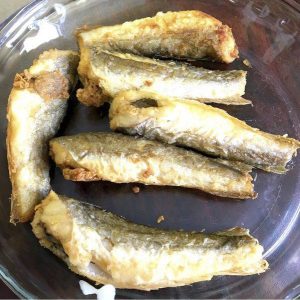 In early July, (Heather Atwood) spoke to Gloucester fisherman Al Cottone, executive director of Gloucester Fisheries Commission, at the Gloucester Fishermen’s Wives offices after his fourth day of fishing for whiting. A strapping, dark-haired, 50-year-old, Cottone confessed he was beat. He’s not used to the unrelenting action that fishing for whiting demands anymore. Cottone has been fishing since he was 17, and has never had any other kind of work. But his ground fish quota this year, allocated by National Oceanic and Atmospheric Administration, was pared down to almost nothing: This means two things: Cottone cannot catch enough fish to make a living, unless he begins leasing quota from other fishermen, which has added costs. (Cottone says that many fishermen are so fed up, or they are just leasing their allocated quota to the few fishermen left, and finding other work.) It also means Cottone is out of shape; he just hasn’t had enough fishing practice recently. But Cottone loves fishing for whiting. Read the story here 10:58
In early July, (Heather Atwood) spoke to Gloucester fisherman Al Cottone, executive director of Gloucester Fisheries Commission, at the Gloucester Fishermen’s Wives offices after his fourth day of fishing for whiting. A strapping, dark-haired, 50-year-old, Cottone confessed he was beat. He’s not used to the unrelenting action that fishing for whiting demands anymore. Cottone has been fishing since he was 17, and has never had any other kind of work. But his ground fish quota this year, allocated by National Oceanic and Atmospheric Administration, was pared down to almost nothing: This means two things: Cottone cannot catch enough fish to make a living, unless he begins leasing quota from other fishermen, which has added costs. (Cottone says that many fishermen are so fed up, or they are just leasing their allocated quota to the few fishermen left, and finding other work.) It also means Cottone is out of shape; he just hasn’t had enough fishing practice recently. But Cottone loves fishing for whiting. Read the story here 10:58
Catch Shares: Commercial fishers on Far South Coast want action on restructure
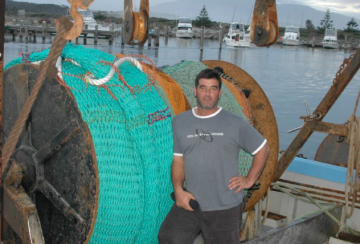 The restructure of the NSW commercial fishing industry is reaching an important milestone with companies and individuals having until tomorrow to decide on whether they take a $20,000 buy-out to exit the industry. NSW Labor called on the State Primary Industries Minister to suspend the restructure process until more information is on the table to assist fishers in making the right decision for themselves, their families, and for the sustainability of the industry in general. But Bermagui Fishermen’s Cooperative managing director Rocky Lagana was of the opposite view and said the three-year restructure process needed to reach a conclusion to afford those who wanted to remain some certainty. Shadow Minister for Primary Industries Mick Veitch however called it policy-on-the-run and said a hastily cobbled together Ministerial press release the day after Labor’s call for a suspension made a few concessions without addressing the real concerns – which are the need for more information, more time and the need to hit the pause button. Read the story here 10:26
The restructure of the NSW commercial fishing industry is reaching an important milestone with companies and individuals having until tomorrow to decide on whether they take a $20,000 buy-out to exit the industry. NSW Labor called on the State Primary Industries Minister to suspend the restructure process until more information is on the table to assist fishers in making the right decision for themselves, their families, and for the sustainability of the industry in general. But Bermagui Fishermen’s Cooperative managing director Rocky Lagana was of the opposite view and said the three-year restructure process needed to reach a conclusion to afford those who wanted to remain some certainty. Shadow Minister for Primary Industries Mick Veitch however called it policy-on-the-run and said a hastily cobbled together Ministerial press release the day after Labor’s call for a suspension made a few concessions without addressing the real concerns – which are the need for more information, more time and the need to hit the pause button. Read the story here 10:26
‘American Greed’ to Depict Fraud Victims, Local Retired Commercial Clammer
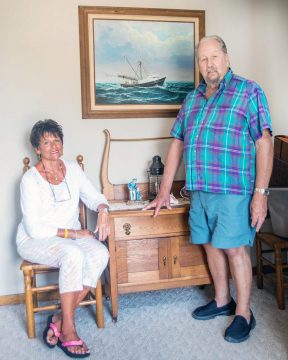 Jack and Dolly Patterson will be watching the Aug.11 episode of “American Greed” with particular disdain. The well-liked and respected residents of High Bar Harbor are featured on the MSNBC-TV show as victims of now-convicted broker Mark Hotton. The Pattersons say that in total they lost $3.2 million in retirement and life savings while investing with Hotton. Hotton, of West Islip, N.Y., is in federal prison on an 11¼-year sentence after pleading guilty to conspiracy to commit money laundering. The prison sentence handed down in U.S. District Court also covers complaints of other individuals and companies claiming losses that total more than $9 million. Jack Patterson, now 72, is a retired commercial clammer, a strenuous, often dangerous profession. As he says, “It wasn’t handed to us.” “Thirty-seven years on the water. And we had saved; we didn’t live beyond our means,” Dolly Patterson remarked. Speaking of hard-earned clamming proceeds from days that began at 1:30 in the morning, “I did good,” he said, “and he took it all.” Read the story here 08:38
Jack and Dolly Patterson will be watching the Aug.11 episode of “American Greed” with particular disdain. The well-liked and respected residents of High Bar Harbor are featured on the MSNBC-TV show as victims of now-convicted broker Mark Hotton. The Pattersons say that in total they lost $3.2 million in retirement and life savings while investing with Hotton. Hotton, of West Islip, N.Y., is in federal prison on an 11¼-year sentence after pleading guilty to conspiracy to commit money laundering. The prison sentence handed down in U.S. District Court also covers complaints of other individuals and companies claiming losses that total more than $9 million. Jack Patterson, now 72, is a retired commercial clammer, a strenuous, often dangerous profession. As he says, “It wasn’t handed to us.” “Thirty-seven years on the water. And we had saved; we didn’t live beyond our means,” Dolly Patterson remarked. Speaking of hard-earned clamming proceeds from days that began at 1:30 in the morning, “I did good,” he said, “and he took it all.” Read the story here 08:38
Florida Keys commercial lobster fleet prepares for Saturday’s opening
 Hopes are high for high prices and calm seas as the Florida Keys commercial lobster fleet prepares for Saturday’s opening of the regular crawfish season. “Based on the level of [juvenile lobster] recruitment we’ve seen, we expect another outstanding season,” Bill Kelly, executive director of the Florida Keys Commercial Fishermen’s Association, said Tuesday. Last year, Key commercial lobster trappers and divers collected about 5.2 million pounds of lobster, which accounts for 90 percent of Florida’s statewide lobster harvest. “Lobster is the largest [commercial fishing] cash crop in the Keys, and the largest in the state of Florida,” Kelly said. “Every season, our biggest issue facing lobster and stone-crab trap fishermen is tropical storms and hurricanes that displace and destroy gear and disrupt the normal migratory pattern of lobster,” Kelly said. “We’ve been pretty fortunate since Hurricane Wilma in 2005.” Read the story here 07:55
Hopes are high for high prices and calm seas as the Florida Keys commercial lobster fleet prepares for Saturday’s opening of the regular crawfish season. “Based on the level of [juvenile lobster] recruitment we’ve seen, we expect another outstanding season,” Bill Kelly, executive director of the Florida Keys Commercial Fishermen’s Association, said Tuesday. Last year, Key commercial lobster trappers and divers collected about 5.2 million pounds of lobster, which accounts for 90 percent of Florida’s statewide lobster harvest. “Lobster is the largest [commercial fishing] cash crop in the Keys, and the largest in the state of Florida,” Kelly said. “Every season, our biggest issue facing lobster and stone-crab trap fishermen is tropical storms and hurricanes that displace and destroy gear and disrupt the normal migratory pattern of lobster,” Kelly said. “We’ve been pretty fortunate since Hurricane Wilma in 2005.” Read the story here 07:55
Brownsville Tx. – Shrimpers struggling to compete with imported shrimp
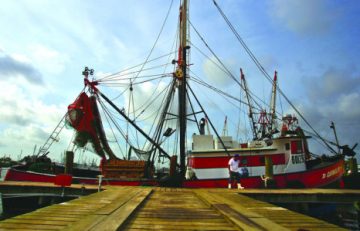 A slow start to the shrimping season has local shrimpers struggling to compete with imported farm-raised shrimp. Shrimpers are eager to return to local waters after being off for two months. “We have two boats and we’re probably one of the few people that actually jumped into this business without having a family history being in the business,” Texas Shrimp Association Executive Director Andrea Hance said. She’s been in the shrimping business since 2007. She said this season is slow, especially when it comes to their prized catch. “We have a niche market in terms of the large jumbo shrimp. We’re just not catching enough of them right now,” Hance said. She said they’re seeing a lot more small shrimp out in the Gulf which is unusual. A five-pound bag of locally-caught shrimp will cost someone about $30. Imported farm-raised shrimp will sell a similar bag for around $24. Video, Read the rest here 07:23
A slow start to the shrimping season has local shrimpers struggling to compete with imported farm-raised shrimp. Shrimpers are eager to return to local waters after being off for two months. “We have two boats and we’re probably one of the few people that actually jumped into this business without having a family history being in the business,” Texas Shrimp Association Executive Director Andrea Hance said. She’s been in the shrimping business since 2007. She said this season is slow, especially when it comes to their prized catch. “We have a niche market in terms of the large jumbo shrimp. We’re just not catching enough of them right now,” Hance said. She said they’re seeing a lot more small shrimp out in the Gulf which is unusual. A five-pound bag of locally-caught shrimp will cost someone about $30. Imported farm-raised shrimp will sell a similar bag for around $24. Video, Read the rest here 07:23

































